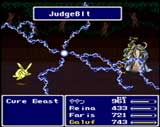 Last year was without a doubt
the best year in the history of gaming for RPG fans. Between FFVIII, Lunar, Legaia, Gran
Stream (and a host of other solid titles) I spent most of the year fighting random
monsters, buying potions, and swearing at bosses. The aforementioned recent RPGs seem to
represent a trend toward assimilating features of other genres (3D polygons, real-time
fighting, etc) in an effort to bring the most conservative of gaming niches up to date.
But for me there is something inexplicably captivating about 2D superdeformed sprites who
are constantly running in place regardless of what is going on around them, and level
designs that challenge only your tolerance for repetitive fighting. And, oh yeah, those
black mages with the pointy hats…you know the ones…
Last year was without a doubt
the best year in the history of gaming for RPG fans. Between FFVIII, Lunar, Legaia, Gran
Stream (and a host of other solid titles) I spent most of the year fighting random
monsters, buying potions, and swearing at bosses. The aforementioned recent RPGs seem to
represent a trend toward assimilating features of other genres (3D polygons, real-time
fighting, etc) in an effort to bring the most conservative of gaming niches up to date.
But for me there is something inexplicably captivating about 2D superdeformed sprites who
are constantly running in place regardless of what is going on around them, and level
designs that challenge only your tolerance for repetitive fighting. And, oh yeah, those
black mages with the pointy hats…you know the ones…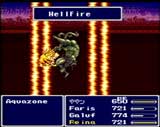 Final Fantasy Anthology brings
two of the most classic 16-bit era SquareSoft RPGs to the PSX platform for the first
time—FFV (never before released in America), and FFVI (more familiar to most of us as
FFIII on the SNES). The conversions feature slightly enhanced graphics, but play largely
like a 16-bit port should. Although the in-game graphics remain mostly untouched, the most
notable additions are the excellent FMVs that frame the stories, and add a little to the
overall plot.
Final Fantasy Anthology brings
two of the most classic 16-bit era SquareSoft RPGs to the PSX platform for the first
time—FFV (never before released in America), and FFVI (more familiar to most of us as
FFIII on the SNES). The conversions feature slightly enhanced graphics, but play largely
like a 16-bit port should. Although the in-game graphics remain mostly untouched, the most
notable additions are the excellent FMVs that frame the stories, and add a little to the
overall plot.
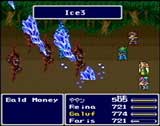 FFVI
places you in the role of [insert your name here], who is (in much the same fashion as
Cloud) initially a pawn of the great MagiTek world-destroying conglomerate, with a faulty
memory, a not so subtle savior-like destiny, and a proclivity toward doing things that you
yourself wouldn’t do during cut-scenes. As the game progresses, of course, you pick
up additional characters, all of which you will recognize in slightly veiled forms from
the other FF games (Gau who has monster abilities, the Moogles, the airship captain, the
ninja—you know the roster).
FFVI
places you in the role of [insert your name here], who is (in much the same fashion as
Cloud) initially a pawn of the great MagiTek world-destroying conglomerate, with a faulty
memory, a not so subtle savior-like destiny, and a proclivity toward doing things that you
yourself wouldn’t do during cut-scenes. As the game progresses, of course, you pick
up additional characters, all of which you will recognize in slightly veiled forms from
the other FF games (Gau who has monster abilities, the Moogles, the airship captain, the
ninja—you know the roster).
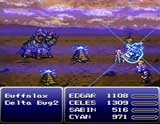 The
fighting system is similar enough to FFVII that it is the obvious predecessor—with
character specific specials that function a lot like limit breaks, and "espers"
that resonate of "materia". The game is long, intricate, and at times
beautifully done (enough to make you forget the software limitations). The spells, while
not as spectacular as later editions, are satisfying in their own quirky little way, and
the backgrounds are often incredible (the ghost train, the haunted forest, etc.). If you
never played this game on the SNES and you consider yourself an RPG fan, you will be doing
yourself a great service if you purchase it immediately. Really. If you have played
it, remember, five years is a long time, and this game has aged beautifully.
The
fighting system is similar enough to FFVII that it is the obvious predecessor—with
character specific specials that function a lot like limit breaks, and "espers"
that resonate of "materia". The game is long, intricate, and at times
beautifully done (enough to make you forget the software limitations). The spells, while
not as spectacular as later editions, are satisfying in their own quirky little way, and
the backgrounds are often incredible (the ghost train, the haunted forest, etc.). If you
never played this game on the SNES and you consider yourself an RPG fan, you will be doing
yourself a great service if you purchase it immediately. Really. If you have played
it, remember, five years is a long time, and this game has aged beautifully.
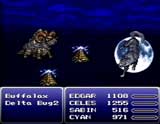 But
on to my favorite, FFV. Why this game was never ported to an American platform before is
beyond me, but it probably has something to do with the fact that the genre was not
particularly popular in the early nineties; at least, not to the degree it is now. If the
only exposure you have had the this little masterpiece was the Japanese ROM for the SNES
Emulator, than you will be happy to know that the story does make (slightly) more sense in
English. You are [NAME], a wandering adventurer who gets tangled up in (again) a massive
plot to save the world from the inimical hostility of an otherworldly supervillain.
Through the course of this quest you accumulate the requisite assortment of companions,
only, in this game they are a finite set of three: Reina the princess, Galuf the
mysterious old man with (again) memory problems, and Faris, the pirate captain. You will
also meet up with everyone’s favorite NPC, Cid, and yes, his airship.
But
on to my favorite, FFV. Why this game was never ported to an American platform before is
beyond me, but it probably has something to do with the fact that the genre was not
particularly popular in the early nineties; at least, not to the degree it is now. If the
only exposure you have had the this little masterpiece was the Japanese ROM for the SNES
Emulator, than you will be happy to know that the story does make (slightly) more sense in
English. You are [NAME], a wandering adventurer who gets tangled up in (again) a massive
plot to save the world from the inimical hostility of an otherworldly supervillain.
Through the course of this quest you accumulate the requisite assortment of companions,
only, in this game they are a finite set of three: Reina the princess, Galuf the
mysterious old man with (again) memory problems, and Faris, the pirate captain. You will
also meet up with everyone’s favorite NPC, Cid, and yes, his airship.
The quote-unquote plot has you cruising around the world trying to prevent the magical
Element Crystals from exploding, being attacked, and otherwise ceasing to function. Like
most of the other installments in this series, you will also take part in some
intergalactic travel, and a tedious desert level.
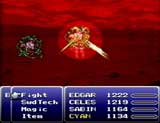 As I
said earlier, you have a set party that is not open to recruitment—however, this
limitation is made up for by what you will immediately recognize as the forerunner of
Final Fantasy Tactics’ Job and Ability system. As you collect shards of the
constantly exploding crystals (you cannot save them, after all), your characters will
receive optional "Jobs" that you can select; as you gain "AB"
(ability) points, you characters will gain selectable job-specific abilities that can be
mixed and matched to create any number of team strategies. Again, like FFT the jobs
include: Chemist, Knight, Lancer, Samurai, Ninja, Red/Black/White/Blue/Time/Summon Mages,
Dancer, Mimic, (my favorite) Geomancer, and Bare (the same as Squire, basically), as well
as Bard, Hunter, Trainer, and a few others that I am probably forgetting…
As I
said earlier, you have a set party that is not open to recruitment—however, this
limitation is made up for by what you will immediately recognize as the forerunner of
Final Fantasy Tactics’ Job and Ability system. As you collect shards of the
constantly exploding crystals (you cannot save them, after all), your characters will
receive optional "Jobs" that you can select; as you gain "AB"
(ability) points, you characters will gain selectable job-specific abilities that can be
mixed and matched to create any number of team strategies. Again, like FFT the jobs
include: Chemist, Knight, Lancer, Samurai, Ninja, Red/Black/White/Blue/Time/Summon Mages,
Dancer, Mimic, (my favorite) Geomancer, and Bare (the same as Squire, basically), as well
as Bard, Hunter, Trainer, and a few others that I am probably forgetting…
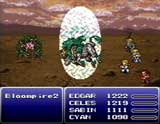 Although
the job system is, I think, perfect in theory, it gets a little bit frustrating in
practice, as some abilities can take up to and including two hundred random fights to
gain. In fact, this game forces you to fight more random monsters than any game in the
history of the universe; but, since that is really the only flaw in the game’s
design, it’s easy to look past (until you get stuck in the aforementioned tedious
desert level). Also, why are Lancers always so worthless?
Although
the job system is, I think, perfect in theory, it gets a little bit frustrating in
practice, as some abilities can take up to and including two hundred random fights to
gain. In fact, this game forces you to fight more random monsters than any game in the
history of the universe; but, since that is really the only flaw in the game’s
design, it’s easy to look past (until you get stuck in the aforementioned tedious
desert level). Also, why are Lancers always so worthless?
Anyway, FF Anthology is a must have for any RPG fan. One of the best games of last
century. Highly recommended. Buy it.

 Last year was without a doubt
the best year in the history of gaming for RPG fans. Between FFVIII, Lunar, Legaia, Gran
Stream (and a host of other solid titles) I spent most of the year fighting random
monsters, buying potions, and swearing at bosses. The aforementioned recent RPGs seem to
represent a trend toward assimilating features of other genres (3D polygons, real-time
fighting, etc) in an effort to bring the most conservative of gaming niches up to date.
But for me there is something inexplicably captivating about 2D superdeformed sprites who
are constantly running in place regardless of what is going on around them, and level
designs that challenge only your tolerance for repetitive fighting. And, oh yeah, those
black mages with the pointy hats…you know the ones…
Last year was without a doubt
the best year in the history of gaming for RPG fans. Between FFVIII, Lunar, Legaia, Gran
Stream (and a host of other solid titles) I spent most of the year fighting random
monsters, buying potions, and swearing at bosses. The aforementioned recent RPGs seem to
represent a trend toward assimilating features of other genres (3D polygons, real-time
fighting, etc) in an effort to bring the most conservative of gaming niches up to date.
But for me there is something inexplicably captivating about 2D superdeformed sprites who
are constantly running in place regardless of what is going on around them, and level
designs that challenge only your tolerance for repetitive fighting. And, oh yeah, those
black mages with the pointy hats…you know the ones…